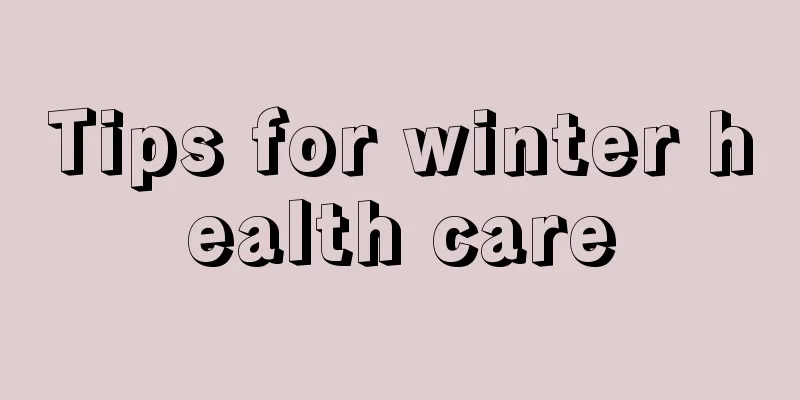Tips for winter health care

|
The arrival of winter will make the climate colder, people are too lazy to go out and exercise less, so the focus of health preservation at this time naturally falls on diet adjustment. So, in terms of winter health care knowledge, what dietary methods are helpful to our health? Let's take a look at the introduction of winter health care knowledge. When the climate is relatively cold in winter, we must have some knowledge about winter health care. For example, in winter, we can eat dates, or brown sugar, longan, and some ginger to make soup to maintain health. After all, these eating methods can help us increase blood circulation in the body, replenish qi and blood, calm the nerves and drive away the cold. Eating warm foods such as mutton and dog meat often in winter can help dispel cold, promote blood vessel dilation, improve blood circulation on the body's surface, and keep the whole body warm. In winter, you can make tea with American ginseng, which can replenish qi and moisten the lungs, nourish yin and replenish yang. It is beneficial for winter health care for middle-aged and elderly people with weak constitutions. Eating some sesame seeds and peanuts regularly in winter can enhance the body's ability to resist cold, dilate blood vessels and promote blood circulation. You can eat some ginger in winter. People often say "With ginger in winter, you won't be afraid of wind and frost." Regular consumption of ginger can promote blood circulation, induce sweating, promote gastric juice secretion and intestinal motility, help digestion and increase appetite. Ginger also has antioxidant effects. Clinically, ginger is often used as an auxiliary treatment for exogenous wind-cold, headache, cough, stomach cold, vomiting and other symptoms. Drinking water cannot be neglected in winter. Many people think that it is cold in winter and the human body sweats less, so they can drink less or no water. This understanding is wrong. Although the human body sweats less in winter, a lot of water can still be lost through the evaporation of tissue fluid through the skin. An adult loses about 600 ml of water a day. This water evaporation occurs unconsciously, so it is also called "insensible evaporation." People also lose water when they breathe. The respiratory tract must keep its surface moist when taking in oxygen and expelling carbon dioxide. This alone consumes 500 ml of water every day. Combined with the water lost through defecation, the body excretes about 2500 ml of water a day. If the human body loses 5% of its water in winter and is not replenished in time, the skin will shrink, the muscles will become weak, and metabolic products will be retained in the body. People will feel tired, irritable, have headaches, dizziness and weakness, and may even induce more serious diseases. Winter health care knowledge is very important to our health, not only in diet, but also in every detail of life. If we ignore the relevant health care knowledge, it will bring a lot of harm to our health. I hope we can realize this. |
<<: What's wrong with my left eyelid twitching
>>: Three tips for keeping healthy in winter
Recommend
What complications may occur with acute myocardial infarction?
Heart disease cannot be ignored. More and more pe...
Shrimp skin can easily cause cancer if left for a long time
Many of us like to add dried shrimps when making ...
What are the effects of small yellow turmeric powder
Many people don’t know that turmeric powder is ac...
What are the dangers of not washing your teeth?
Oral health is an important issue that we cannot ...
What should I do if I suffer from severe hair loss?
What should you do if you are suffering from seve...
The harm of ethylene to the body
Due to the improvement of living standards, many ...
What are the wonderful uses of expired Coke?
Coke is a very popular drink in modern society. T...
Treatment of gastric cancer
Although many foreign hospitals have started neoa...
What are the benefits of scraping the whole body
Gua Sha is a massage method that is familiar to p...
Does your ears make a crackling sound when you press them?
If your ears make a crackling sound when you pres...
What to do if there is a bad taste in your mouth
Many people experience a bad taste in their mouth...
The hazards of electric ceramic stoves
Many friends know what an induction cooker is, bu...
What are the sequelae of radiation for laryngeal cancer
The occurrence of laryngeal cancer is related to ...
How to wear summer clothes with scars on the neck
It is inevitable to encounter bumps and bruises i...
Methods to prevent ovarian cancer
Ovarian cancer is very harmful to female friends....









